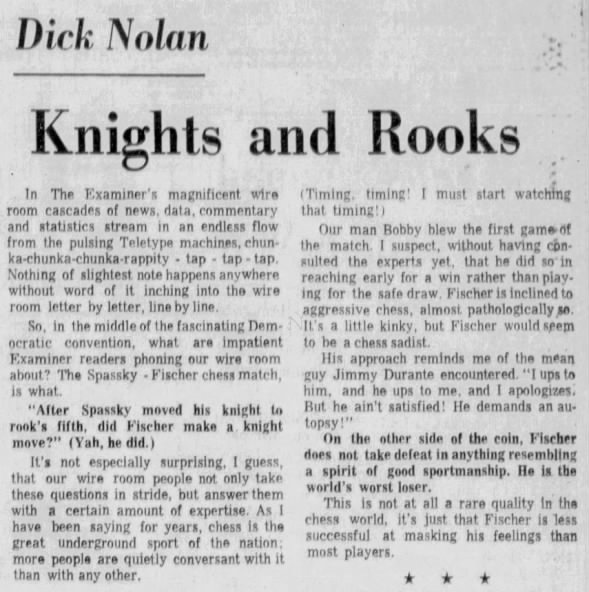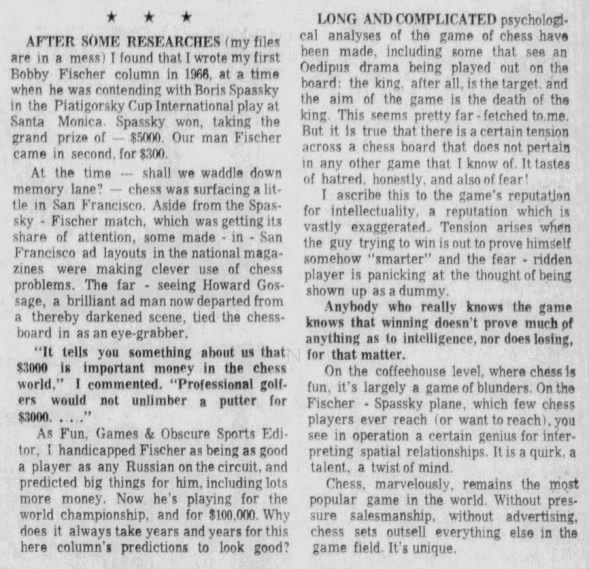The San Francisco Examiner San Francisco, California Thursday, July 13, 1972 - Page 33
Knights and Rooks by Dick Nolan
In The Examiner's magnificent wire room cascades of news, data, commentary and statistics stream in an endless flow from the pulsing Teletype machines, chunka-chunka-chunka-rappity - tap - tap - tap. Nothing of slightest note happens anywhere without word of it inching into the wire room letter by letter, line by line.
So, in the middle of the fascinating Democratic convention, what are impatient Examiner readers phoning our wire room about? The Spassky-Fischer chess match, is what.
“After Spassky moved his knight to rook's fifth, did Fischer make a knight move?” (Yah, he did.)
It's not especially surprising, I guess, that our wire room people not only take these questions in stride, but answer them with a certain amount of expertise. As I have been saying for years, chess is the great underground sport of the nation; more people are quietly conversant with it than with any other.
AFTER SOME RESEARCHES (my files are in a mess) I found that I wrote my first Bobby Fischer column in 1966, at a time when he was contending with Boris Spassky in the Piatigorsky Cup International play at Santa Monica. Spassky won, taking the grand prize of — $5000. Our man Fischer came in second, for $300.
At the time — shall we waddle down memory lane? — chess was surfacing a little in San Francisco. Aside from the Spassky-Fischer match, which was getting its share of attention, some made-in-San Francisco ad layouts in the national magazines were making clever use of chess problems. The far-seeing Howard Gosage, a brilliant ad man now departed from a thereby darkened scene, tied the chessboard in as an eye-grabber.
“It tells you something about us that $3000 is important money in the chess world,” I commented. “Professional golfers would not unlimber a putter for $3000. . . .”
As Fun, Games & Obscure Sports Editor, I handicapped Fischer as being as good a player as any Russian on the circuit, and predicted big things for him, including lots more money. Now he's playing for the world championship, and for $100,000. Why does it always take years and years for this here column's predictions to look good?
(Timing, timing! I must start watching that timing!)
Our man Bobby blew the first game of the match. I suspect, without having consulted the experts yet, that he did so in reaching early for a win rather than playing for the safe draw. Fischer is inclined to aggressive chess, almost pathologically so.
His approach reminds me of the mean guy Jimmy Durante encountered. “I ups to him, and he ups to me, and I apologizes. But he ain't satisfied! He demands an autopsy!”
On the other side of the coin, Fischer does not take defeat in anything resembling a spirit of good sportsmanship. He is the world's worst loser. ([This is patently not true. Fischer was a true professional in his sportsmanship, but didn't take kindly to people who cut corners on fair play and ethics, cheating or breaking the rules.])
This is not at all a rare quality in the chess world, it's just that Fischer is less successful at masking his feelings than most players. ([This is TRUE. Robert Fischer was on the Autism Spectrum from cradle to the grave and the result, exhibited an overt brutal honesty affecting every aspect of his life. What kind of people dislike the Fischers of the world who are “honest”? You must answer that for yourself.])
LONG AND COMPLICATED psychological analyses of the game of chess have been made, including some that see an Oedipus drama being played out on the board: the king, after all, is the target, and the aim of the game is the death of the king. This seems pretty far-fetched to me. But it is true that there is a certain tension across a chess board that does not pertain in any other game that I know of. It tastes of hatred, honestly, and also of fear!
I ascribe this to the game's reputation for intellectuality, a reputation which is vastly exaggerated. Tension arises when the guy trying to win is out to prove himself somehow “smarter” and the fear-ridden player is panicking at the thought of being show up as a dummy.
Anybody who really knows the game knows that winning doesn't prove much of anything as to intelligence, nor does losing, for that matter.
On the coffeehouse level, where chess is fun, it's largely a game of blunders. On the Fischer-Spassky plane, which few chess players ever reach (or want to reach), you see in operation a certain genius for interpreting spatial relationships. It is a quirk, a talent, a twist of mind.
Chess, marvelously, remains the most popular game in the world. Without pressure salesmanship, without advertising, chess sets outsell everything else in the game field. It's unique.
 Knights and Rooks by Dick Nolan 13 Jul 1972, Thu The San Francisco Examiner (San Francisco, California) Newspapers.com
Knights and Rooks by Dick Nolan 13 Jul 1972, Thu The San Francisco Examiner (San Francisco, California) Newspapers.com
 Knights and Rooks by Dick Nolan 13 Jul 1972, Thu The San Francisco Examiner (San Francisco, California) Newspapers.com
Knights and Rooks by Dick Nolan 13 Jul 1972, Thu The San Francisco Examiner (San Francisco, California) Newspapers.com























